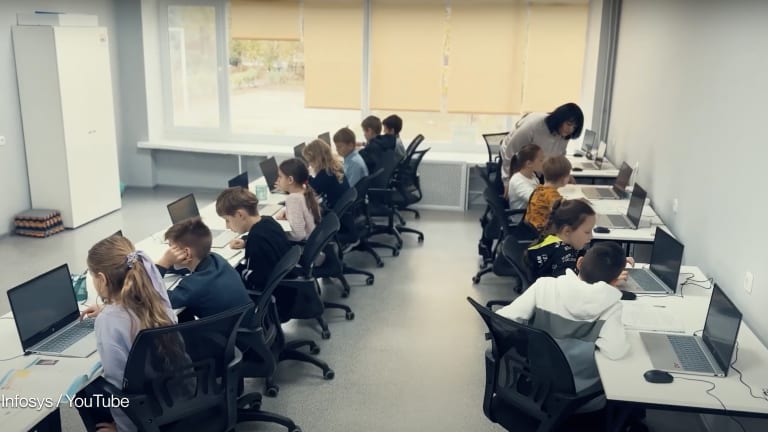
This year, the world hit a grim milestone: Over 130 million people are displaced and in desperate need of humanitarian aid. That was before the massive flooding across Pakistan, before Hurricane Fiona hit land in Puerto Rico last month, and before Super Typhoon Noru made landfall in the Philippines last week. But the disaster extends beyond hurricanes, flooding, and bombing. Our aid system — and the big humanitarian organizations that comprise it — is in crisis. Today’s humanitarian system emerged from the ashes of the first two world wars. It wasn’t designed to meet the types of protracted, complex emergencies that are displacing so many people today. Nor has it leveraged the technology developed over the last two decades. We need to transform aid itself.
Partly, the issue is growing demand. The number of people displaced by conflict and climate change has grown exponentially over the past decade and is only likely to worsen. Even before the war in Ukraine or last month’s floods, there were massive budget shortfalls. In 2021, international donors provided $17.2 billion for humanitarian aid, less than half of what was needed to meet global needs. But even a massive increase in funding would not solve the problem.
Our current system is inherently slow, inefficient, and siloed. Organizations spend between 60-80% of humanitarian funding on logistics. Byzantine procurement processes regulate everything down to the exact type of blanket an aid organization can provide. It’s also expensive: The aid sector has grown into a multibillion-dollar industry. Yet the largest players still cannot keep up with the growing pace of needs worldwide.
We have witnessed the limitations of these organizations that are part of the “Big Aid” system firsthand as founders of a humanitarian tech startup. We started our company in 2016 to provide real-time communications tools for the grassroots system of aid that emerged in Europe in response to the Syrian refugee emergency.
When over 5 million Syrians fled at the height of the country’s civil war in 2015-16, large humanitarian organizations and governments were overwhelmed by the needs. Concerned civilians responded en masse, forming grassroots organizations to provide food, clothing, and other essential services to refugees across Europe.
Six years later, well after the most prominent international organizations have abandoned their efforts, many of these small organizations are still responding to what has become a protracted crisis.
We’re now seeing a similar dynamic play out across eastern Europe and Pakistan where countless local organizations outside of the international aid system are stepping up to help. Without them, there simply would not be enough support for the people who need it.
This parallel system of aid is radically different from the resource-heavy organizations consuming most donor dollars and attention. Local organizations are nimble and efficient, able to do much more with fewer resources. They understand the local context. And they tend to use emergent, networked technologies to communicate quickly and to help as many people as possible.
Like a massive, aging tanker ship, Big Aid can’t keep up, can’t change course, and can't be as agile and efficient as the fleet of underfunded, modern relief organizations that are already responding.
“The world of 2022 looks different from the world that gave birth to our current humanitarian system. Our institutions should reflect that. And if they can’t, we need to build new ones.”
—And yet, these local organizations and emergent models are overlooked and underfunded, dwarfed by massive marketing campaigns that funnel donor attention and dollars to the same marquee organizations, crisis after crisis.
It’s time to recognize that this grassroots system of aid is the future and deserves our support. But how? Donors are increasingly recognizing the value of giving locally. Young people are hungry for new approaches.
First, we need to put affected communities at the center of decisions that affect them. There’s a growing movement to ensure that more funding goes to locally led organizations and to ensure that policy decisions include meaningful participation from the people most affected.
Shift the Power, RSEAT, and the Resourcing Refugees Leadership Initiative are at the forefront of this work. We need to look to Ukrainians, Pakistanis, and others directly affected to help identify what technology, financial models, and policies should support the emerging response.
Next, we need robust but straightforward ways to identify and support the best local organizations. What if large funders invested in updated databases of local organizations worldwide, where donors could see feedback on the NGOs from aid recipients themselves? Since no such database currently exists, consider giving through Global Giving and other trusted partners that direct funds locally.
Finally, we need to support innovations that can transform today’s aging aid system into a dynamic, tech-enabled, and responsive force for good. Examples abound. Hala Systems provide early warning systems to civilians. Organizations such as WeRobotics are leveraging drone technology, while startups such as Enlight Aid are building blockchain solutions for transparent giving. There are risks in supporting emergent technologies in the aid sector. But the risks associated with maintaining Big Aid’s status quo are greater.
The world of 2022 looks different from the world that gave birth to our current humanitarian system. Our institutions should reflect that. And if they can’t, we need to build new ones.









